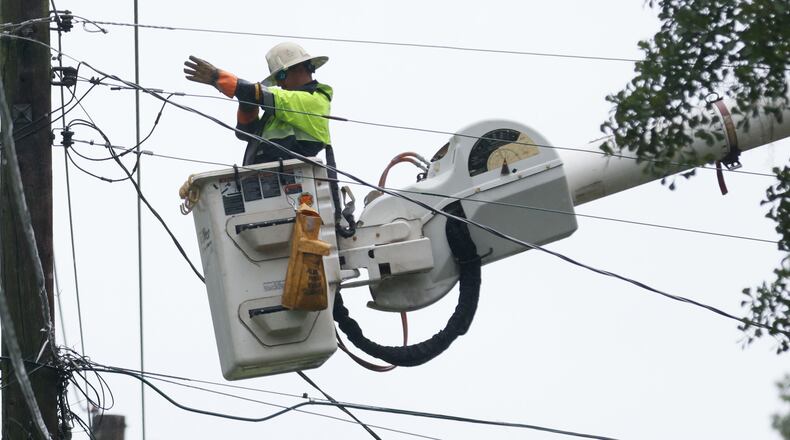Georgia Power, the state’s largest electric utility, will receive a $160 million federal grant to help fund transmission upgrades the company says will allow its system to better withstand extreme weather and allow for smoother integration of renewables, like solar.
The grant money announced Friday comes from the U.S. Department of Energy’s Grid Resilience and Innovation Partnerships Program, which was created by the Bipartisan Infrastructure Law passed in 2021. Georgia Power’s slice is part of a larger, $10.5 billion pot of funding set aside by the law to help modernize the country’s electric infrastructure.
White House National Climate Advisor Ali Zaidi said in a statement last week that recent hurricanes have illuminated the urgent need for electricity infrastructure upgrades. In the immediate aftermath of Hurricane Helene’s pass through Georgia, more than 1.7 million electricity customers statewide, including those served by not-for-profit cooperatives, were left without power.
“We need our grid better adapted to storms like hurricanes Helene and Milton and other extreme climate disasters like the wildfires out west,” Zaidi said. “We need our grid better wired to accelerate America’s manufacturing renaissance and leadership in artificial intelligence. We need our grid better able to bring online cheaper, cleaner power.”
Credit: HYOSUB SHIN / AJC
Credit: HYOSUB SHIN / AJC
Georgia Power, which has more than 2.7 million customers, is matching the federal grant with $160 million of its own. The company plans to use to the funding for “grid-enhancing technologies” including dynamic line rating, a solution that can help allow electricity to move through the grid more efficiently, according to the DOE.
The company also plans to “reconductor” many existing high-voltage transmission lines, replacing old conductors with more efficient, modern ones. In rural South Georgia, where the bulk of the state’s large solar installations are being built, high-voltage lines are key to tying new renewable capacity into the grid. Georgia Power says upgrading existing lines is faster than building new ones and will allow it to move more of those added electrons through the system using existing rights of way.
Georgia Power has called Hurricane Helene the most destructive storm in its history, forcing the repair or replacement of more than 8,300 utility poles, an estimated 1,000 miles of wire and more than 4,500 transformers. Company spokesman Jacob Hawkins said the company has restored power to all customers who lost electricity after Hurricane Helene, but significant parts of its grid still needs to be rebuilt.
Hawkins said the funding will be used to boost resilience in many parts of the state, including in areas that were hit hard by the storms.
Georgia Transmission Corporation is also receiving $98 million to test new grid technologies with 11 other not-for-profit rural utilities and share the results with their industry partners. Georgia Transmission builds and maintains the electricity transmission infrastructure used by 38 electric membership cooperatives across the state.
The consortium, which is also matching the $98 million in federal funding, plans to use the grant to build, rebuild or reconductor transmission lines with advanced overhead conductors. The group will also develop best practices and other guidelines based on its work that it will share across the industry.
Barbara Hampton, Georgia Transmission Corporation’s president and CEO, said the investment will help her organization and its partners “improve electric resiliency and increased capacity in our respective rural communities.”
The grants are the second batch of DOE funding Georgia has received to bolster its electric infrastructure.
Last fall, a coalition of Georgia electricity producers and distributors received a $249 million federal grant to add transmission lines, battery storage and build resilience to power outages.
A note of disclosure
This coverage is supported by a partnership with Green South Foundation and Journalism Funding Partners. You can learn more and support our climate reporting by donating at ajc.com/donate/climate.
About the Author
Keep Reading
The Latest
Featured




